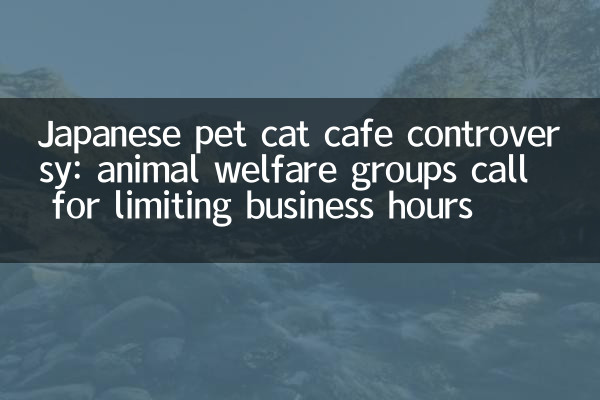Japanese pet cat cafe controversy: animal welfare groups call for limiting business hours
In recent years, pet cat cafes have become a popular check-in spot in Japan, attracting a large number of tourists and cat lovers. However, this business model has recently caused controversy, with animal welfare organizations pointing out that long-term business may have negative impacts on cat health and calling on the government to introduce restrictions. The following are the focus content and structured data that have been hotly discussed across the Internet in the past 10 days.
Controversial background

Pet Cafe originated in Taiwan and became popular in Japan. Customers can enjoy drinks while interacting with the cat. According to statistics, there are currently more than 150 cat cafes in Japan, mainly concentrated in major cities such as Tokyo and Osaka. However, some cafes are open for more than 12 hours, and cats are being touched and photographed for a long time, which has caused concerns among animal welfare organizations.
| Data Category | Value | source |
|---|---|---|
| Number of Japanese cat cafes | 150+ | Japan Pet Industry Association (2023) |
| Average daily business hours | 10-12 hours | Tokyo Animal Welfare Organization Survey |
| Cats interact daily | 50-100 times | Research on animal behavior at Osaka University |
Animal Welfare Organization's allegations
A recent report by the Japanese animal welfare organization "Paws for Life" pointed out that cats show obvious stress symptoms in long-term business environments, including decreased appetite, excessive hair care and evasion. The organization called for limiting daily business hours to less than 6 hours and forcing a "cat rest area". Here are the key issues mentioned in the report:
| Question Type | Incidence rate | Solution suggestions |
|---|---|---|
| Health problems caused by stress | 68% of cafes have cases | Shorten business hours and regular veterinary examinations |
| Deficient sleep | Average reduction of 3-4 hours/day | Set up a separate lounge |
| Attacks caused by excessive contact | 42% of cats appear | Limit customer interaction time |
Industry and public reaction
Cat Cafe operators generally oppose mandatory shortening of business hours, believing that this will seriously affect income. The owner of Tokyo's "Cat Star Park" said: "We have adopted a shift system, and cats actually work for no more than 5 hours a day." However, zoologists pointed out that even if they take shifts, the environmental noise of the cafe and strangers can still cause cats to experience chronic stress.
Public opinion is polarized. Social media surveys show:
| Viewpoint | Support ratio | Main population |
|---|---|---|
| Support restricted business hours | 57% | Women over 30 years old |
| Oppose government intervention | 43% | Visitors aged 20-29 |
International Comparison and Legislative Trends
Compared with Japan, some European countries have implemented strict regulations. Berlin, Germany requires each cat to have 4 hours of separate rest time per day, and night business is prohibited. Animal legal experts believe that Japan may need to refer to these cases to formulate localization norms.
At present, the Ministry of Environment of Japan is considering revising the Animal Protection and Management Law, intending to include cat cafes in the scope of special breeding facilities. The proposal includes:
Conclusion
The essence of this dispute is the balance between commercial interests and animal welfare. As public awareness of animal protection increases, the Japanese cat cafe industry may face major adjustments. In the next two months, the results of the relevant hearings will directly affect the legislative process and deserve continued attention.

check the details

check the details